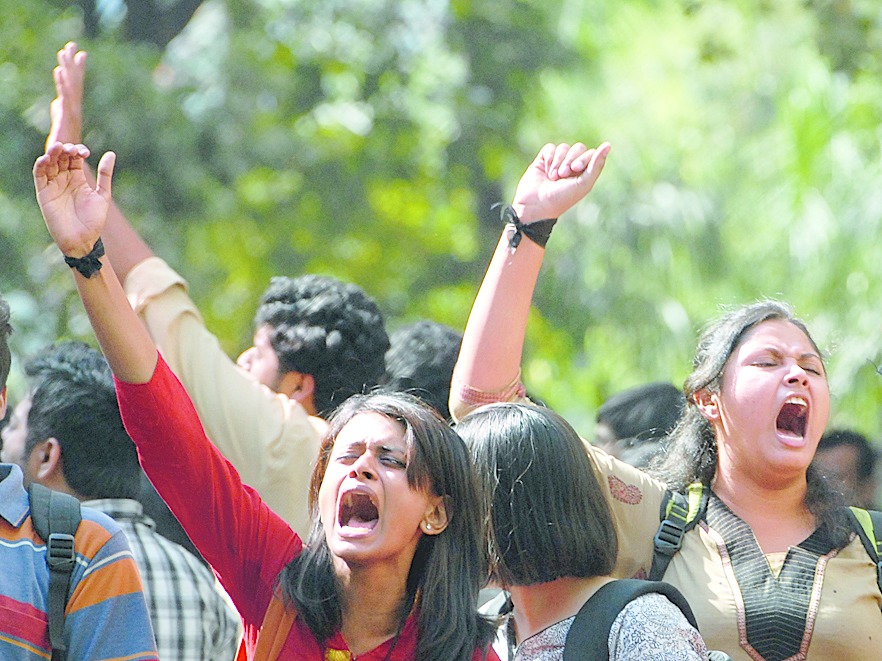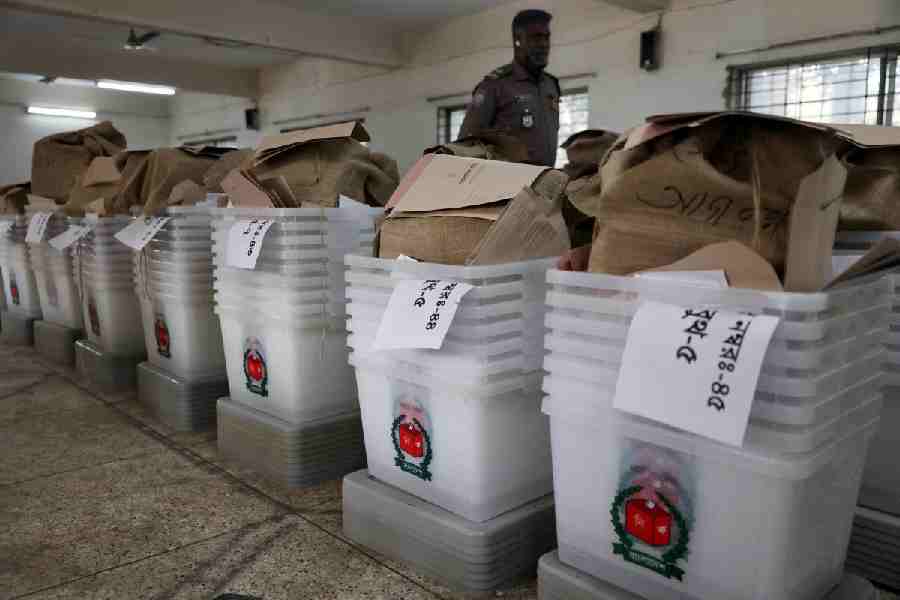
Teachers' Day would have come and gone by the time this is published. But as our special day approaches, I find myself feeling both happy and sad. I feel happy thinking of my teachers, colleagues and students over the long years I have been associated with the world of school, knowing well that it is a sure sign of advancing age if you reminisce too often or go on talking about the 'good old days'. You must embrace change if you wish to be relevant and there are enough things happening in school education to keep you excited. But I can't help feeling distressed and disturbed about the changing relationship between the teacher and the taught. It is true that the role of the teacher has undergone a sea-change. Teachers are not supposed to teach these days - they are expected to 'facilitate'. They are required to be self-effacing individuals who gently guide from the sidelines while their students function, ideate, discuss and execute in the central arena. The question that is now more frequently asked is whether the classroom teacher has become redundant. There are enough virtual teachers, coaches and private tutors available for the asking and one can select excellent online courses instead of having to learn from the teachers employed by the school. The teacher is no longer the source of all knowledge - any kind of information is out there for the asking.
The devaluation of the teacher's role has resulted in an erosion of respectfulness towards teachers on the part of students, their parents and indeed by society at large. It can be argued that society itself has undergone a change and that there is a noticeable coarsening of culture around us. Young people (and in my opinion their elders too) are not as well-mannered as they were even a few years ago and I am taking into account the inevitable changes that can be expected over the years in the acceptable codes of good conduct and social behaviour. Student incivility is definitely on the rise and the appalling behaviour of our public figures is not only assaulting our sensibilities but is also affecting our young.
Day in and day out we read and hear about instances of campus violence and of teachers, headmasters, professors and vice-chancellors being insulted, ill-treated and even physically attacked by students. As for the barbaric practice of gherao, I wonder how it became an acceptable form of protest. At times, the authorities take the stand that the protesters are too young to realize what they are doing. This is ridiculous. College students are adults and have the right to vote. Therefore they must be held responsible for their actions. I see no reason why they should be exempted from penalties for vandalism, for trespassing or for breaking any law of the land. In fact, I would go further to state that one of the goals of education should be to develop socially responsible individuals. Even school students should be made to understand the consequences of their actions in an appropriate manner right from the primary level. History tells us that civilizations decline and fall owing to "internal erosion" rather than any cataclysmic event. The absence of decorum, general boorishness and tastelessness, the increasingly commercial nature of the teacher-student relationship are ominous signs of a society in decline.
Why has the old bond between teacher and pupil all but vanished? A major factor is the commodification of education and the market model of the student as consumer. Also, fierce competition and career concerns seem to be affecting the teacher-student equation. Many teachers are responding to market forces. These teachers are highly professional and maintain a strictly businesslike relationship with their students and employers. They will have you know that their time is precious and they expect to be financially compensated for whatever they do. Some students appreciate this professionalism and do not look for anything beyond - as long as the teacher "delivers". There are teachers whose after-school activities are far more lucrative than their school jobs. The school gives them their professional identity and the platform from where they take off. But I firmly believe that in this scheme of things there is no room for the teacher who would be friend and philosopher and it is unlikely that a great teacher will emerge from this lot.
I often try to fathom why students are transformed so dramatically after they leave high school and enter college. Is there a deep pent-up hostility or suppressed aggressiveness which erupts in the free environs of the college campus? My theory is that school is a very artificial world - sanitized and far removed from reality. Children therein demonstrate excellent manners and pay respect to all their teachers whether they like it or not. But I suspect that many of these children have a parallel life of their own outside the school walls and especially in the cyberworld. The virtual world gives them the security of anonymity and in the absence of authority they express themselves any which way using,with abandon, language they would not use face to face. Insults and abuses are exchanged freely, teachers are ridiculed and games of revenge are played out. Here too I find the contradictions and hypocrisy in society quite puzzling. Words like 'sex' and 'breast' and most expletives are blacked out from our TV screens yet in real life children and their parents use expressions in English, Bengali and Hindi which one did not ever imagine would enter a bhadralok's vocabulary.
It is true that students have always talked about their teachers behind their backs, made fun of them, written witty poems about their idiosyncrasies and drawn delightful cartoons of them. I was presented with one of me by a student on Teachers' Day and it has remained part of my most treasured memorabilia. Years later, the same cartoonist-student, asked me to launch her first book of poems. I was very moved on that occasion. There was a degree of restraint when students joked about their teachers and the lakshmanrekha was meticulously maintained. I laugh to myself when I think of the innocent teacher- jokes that used to do the rounds. A couple of examples will serve to illustrate this. Joke one: "I don't think I deserved zero for this answer," complained a student. "I agree," the teacher replied, "but that's the lowest mark I could give you." Joke two: "You can't sleep in my class!" exclaimed the teacher. "I know," said the student, "but maybe I could if you were just a little quieter".
The innocence of those happy days cannot be retrieved but there is no point wringing our hands and lamenting about that lost world. On Independence Day this year, Sunanda K. Datta-Ray wrote a very depressing piece on how the hopes of the first Independence Day remain unfulfilled. The last sentence of this article left the reader feeling quite hopeless and helpless. "It's a sombre reflection... that every passing year and every change of personnel makes a grand destiny seem more and more unreal." Leave alone a 'grand destiny' - one fears for the very future of India if the teaching-learning environment is not put in order. The time has come for a clarion call for course correction and the onus is on teachers to reflect on the road map ahead.
Some of the reasons for student unrest and incivility that are cited include poor high school preparation, inadequate parenting, distrust of authority, changing student demographics and the inability to meet the rigours of academe.
How do we restore sanctity to the teaching-learning environment? First, we should keep politics and political parties out of academia. This does not mean that politics should not be discussed in an educational institution but party politics must be kept out. We teachers need to keep the changing character of the student population in mind, maintain an inclusive attitude and listen to all with respect. We have to keep a finger on the pulse of our students - simmering discontent must not be permitted to continue. But we must never adopt a strategy of appeasement. It is extremely important for us to teach our students the language of disagreement and when they leave school, it is hoped that they will learn a civilized language of protest. Students must learn how to listen to their opponents with an open mind. Incidentally, those in Parliament must learn this as well. Unfortunately, most schools teach students to debate but they don't teach the skills of negotiating and consensus building. Finally, if we really wish to address the issue of uncivil behaviour and breaches of civilized conduct, we need to engage with our students from our perspective as teachers and mind our own language while doing so.
I am writing this last paragraph after the Teachers' Day celebrations in our school today and I must confess that I am feeling upbeat again. We teachers basked in the affection and adoration that was heaped upon us. "Nobody knows us better than our students," I said to myself. But then I realize that it all happened within the four walls of our school.
The author is director, Modern High School for Girls, Calcutta











